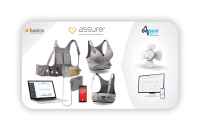Study part of broader Company efforts to make health tools more accessible and reduce the risk of life-threatening events like stroke
SAN FRANCISCO–(BUSINESS WIRE)–Fitbit (NYSE: FIT) today launched the Fitbit Heart Study, its first large-scale, virtual study to validate the use of its wearable technology to identify episodes of irregular heart rhythm suggestive of atrial fibrillation (AFib), the most common form of heart rhythm irregularity. This study is part of the Company’s broader strategy to make easy-to-use tools that accelerate detection of a range of conditions more accessible. The Fitbit Heart Study aims to enroll hundreds of thousands of people, and its results will support the Company’s regulatory submissions globally.
AFib affects nearly 33.5 million people globally1 and patients with AFib have a five times higher risk of stroke.2 3 It can also be difficult to detect, as episodes can be sporadic and asymptomatic, and some studies suggest that as many as 25 percent of people who have an AFib-related stroke only find out they have AFib after a stroke has occurred.4
“Until recently, tools for detecting AFib had a number of limitations and were only accessible if you visited a doctor,” said Steven Lubitz, M.D., M.P.H, principal investigator of the Fitbit Heart Study, cardiologist at Massachusetts General Hospital and Associate Professor of Medicine at Harvard Medical School. “My hope is that advancing research on innovative and accessible technology, like Fitbit devices, will lead to more tools that help improve health outcomes and reduce the impact of AFib on a large scale.”
Fitbit wearables have the unique potential to accelerate AFib detection because their 24/7 heart rate tracking is powered by long battery life, which allows users to wear their device for multiple days at a time. This enables long-term heart rhythm assessment, including when users are asleep. The optimal way to identify irregular rhythm through heart rate tracking technology is to screen when the body is at rest, making assessment overnight, while people sleep, ideal for detection.
“Since we first brought heart rate tracking to the wrist in 2015, we have continued to innovate and provide users with a deeper understanding of their heart health through features like Sleep Stages, Cardio Fitness Level and now Active Zone Minutes,” said Eric Friedman, Fitbit co-founder and CTO. “The Fitbit Heart Study advances our heart health efforts. Long-term passive heart rhythm assessment with our wide range of affordable devices powered by 24/7 heart rate tracking technology has the potential to improve earlier identification of AFib, which is a key to reducing the risk of a life-threatening event like stroke. By doing this important research we have the opportunity to develop and provide access to technology that may be able to improve public health and save lives.”
To track heart rate, Fitbit’s devices use photoplethysmography (PPG) technology to measure the rate of blood flow directly from a user’s wrist. Theoretically, these measurements can be used to determine a user’s heart rhythm, which Fitbit’s algorithm will analyze for irregularities in the Fitbit Heart Study. Study participants who receive a notification about an irregular heart rhythm will be connected with a doctor for a virtual appointment at no cost to get more information and may receive an electrocardiogram (ECG) patch in the mail at no cost to confirm the notification.
Broader commitment to heart health
The Fitbit Heart Study is part of Fitbit’s broader approach to heart health innovation, which includes industry partnerships and the development of other technologies focused on raising awareness and accelerating detection of AFib to reduce the risk of stroke and improve population health. In addition to the technology being examined in the Fitbit Heart Study, the company has made significant progress in the development of a new electrocardiogram (ECG) feature for spot detection of AFib.
Fitbit aims to provide users with both long- and short-term AFib assessment options based on their individual needs and is developing PPG and ECG tools that could offer both long-term assessment and spot-check AFib detection. The Fitbit PPG-based heart rhythm tool is designed to identify irregular rhythm episodes with no symptoms that might otherwise go undetected, and the Fitbit ECG feature is designed to support those who want to screen themselves for possible AFib and record an ECG trace they can review with their doctor. The Company has completed a pivotal clinical trial of its new ECG feature and plans to seek review by the U.S. Food and Drug Administration (FDA) and global regulatory authorities.
Additionally, following FDA clearance for the PPG AFib algorithm, Fitbit will continue to work with the Bristol-Myers Squibb-Pfizer Alliance to develop programs and educational content that will help identify and support people in the U.S. at increased risk for stroke to provide a continuous and supported care pathway that extends to AFib diagnosis.
How to join the Fitbit Heart Study
The study is open to people in the United States ages 22 years and older with a current Fitbit device that tracks heart rate, including Fitbit IonicTM, Fitbit VersaTM family of smart watches, Fitbit Charge 3TM, Fitbit Charge 4TM, and Fitbit Inspire HRTM. Participant data will be kept confidential and will only be shared with study partners in connection with the study. For more details on the Fitbit Heart Study or to enroll, visit the Fitbit Heart Study website. The study will support the clinical evaluation of the Company’s PPG AFib algorithm, including whether it can successfully identify episodes of irregular heart rhythm.
About Fitbit, Inc. (NYSE: FIT)
Fitbit helps people lead healthier, more active lives by empowering them with data, inspiration and guidance to reach their goals. Fitbit designs products and experiences that track and provide motivation for everyday health and fitness. Fitbit’s diverse line of innovative and popular products include Fitbit Charge 4™, Fitbit Charge 3™, Fitbit Inspire HR™, Fitbit Inspire™ and Fitbit Ace 2™ activity trackers, as well as the Fitbit Ionic™ and Fitbit Versa™ family of smartwatches, Fitbit Flyer™ wireless headphones, and Fitbit Aria family of smart scales. Fitbit products are carried in approximately 39,000 retail stores and in 100+ countries around the globe. Powered by one of the world’s largest databases of activity, exercise and sleep data and Fitbit’s leading health and fitness social network, the Fitbit platform delivers personalized experiences, insights and guidance through leading software and interactive tools, including the Fitbit and Fitbit Coach apps, and Fitbit OS for smartwatches. Fitbit’s paid subscription service, Fitbit Premium, uses your unique data to deliver actionable guidance and coaching in the Fitbit app to help you reach your health and fitness goals. Fitbit Health Solutions develops health and wellness solutions designed to help increase engagement, improve health outcomes, and drive a positive return for employers, health plans and health systems.
Fitbit and the Fitbit logo are trademarks or registered trademarks of Fitbit, Inc. in the U.S. and other countries. Additional Fitbit trademarks can be found www.fitbit.com/legal/trademark-list. Third-party trademarks are the property of their respective owners.
Connect with us on Facebook, Instagram or Twitter and share your Fitbit experience.
Forward Looking Statement
This press release contains forward-looking statements, within the meaning of the safe harbor provisions of the Private Securities Litigation Reform Act of 1995, that involve risks and uncertainties including, among other things, statements of our products to identify or detect AFib; and progress developing our ECG or PPG features, including but not limited to submission of such products to the FDA. These forward-looking statements are only predictions and may differ materially from actual results due to a variety of factors, including the effects of the highly competitive market in which we operate, including competition from much larger technology companies; any inability to successfully develop and introduce new products, features, and services or enhance existing products and services; product liability issues, security breaches or other defects; the impact of the recent outbreak of the COVID-19 virus; and other factors discussed under the heading “Risk Factors” in our most recent report on Form 10-K filed with the Securities and Exchange Commission. All forward-looking statements contained herein are based on information available to us as of the date hereof and we do not assume any obligation to update these statements as a result of new information or future events.
1Chugh S, Havmoeller R, Narayanan K, Singh D, Rienstra M, Benjamin E, Gillum R, Kim YH, McAnulty Jr JH, Zheng ZJ. Worldwide Epidemiology of Atrial Fibrillation: Global Burden of Disease 2010 Study. Circulation. 2014; 129: 837-847
2January CT, Wann LS, Alpert JS, et al. American College of Cardiology/American Heart Association Task Force on Practice Guidelines. 2014 AHA/ACC/HRS guideline for the management of patients with atrial fibrillation. A report of the American College of Cardiology/American Heart Association Task Force on practice guidelines and the Heart Rhythm Society. J Am Coll Cardiol. 2014;64(21):e1-e76
3Wolf PA, Abbott RD, Kannel WB. Atrial fibrillation is an independent risk factor for stroke: The Framingham Study. Stroke. 1991;22(8):983-988.
4Freedman B, Potpara TS, Lip GY. Stroke prevention in atrial fibrillation. Lancet. 2016;388:806–817
Contacts
Jen Ralls 415-941-0037, PR@Fitbit.com






